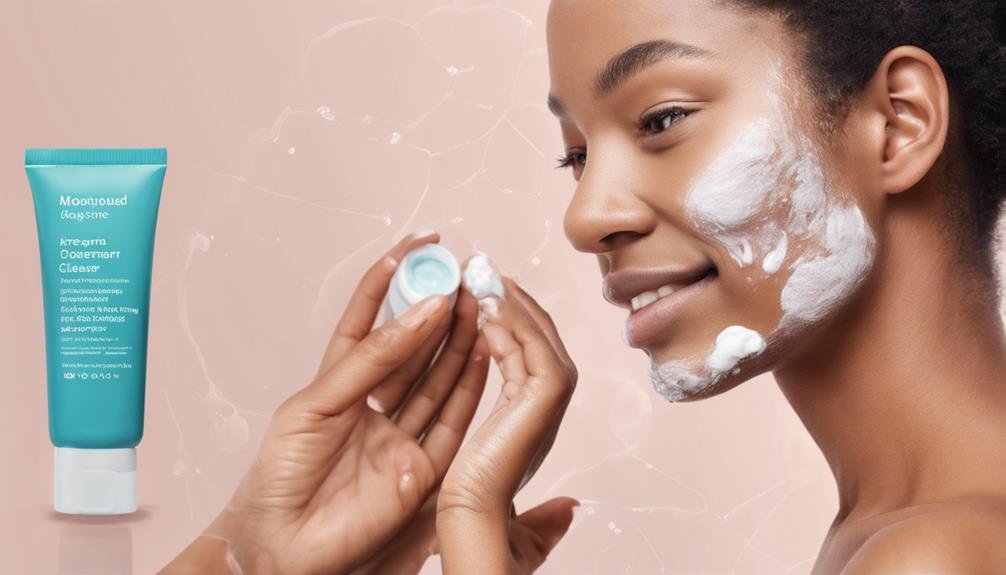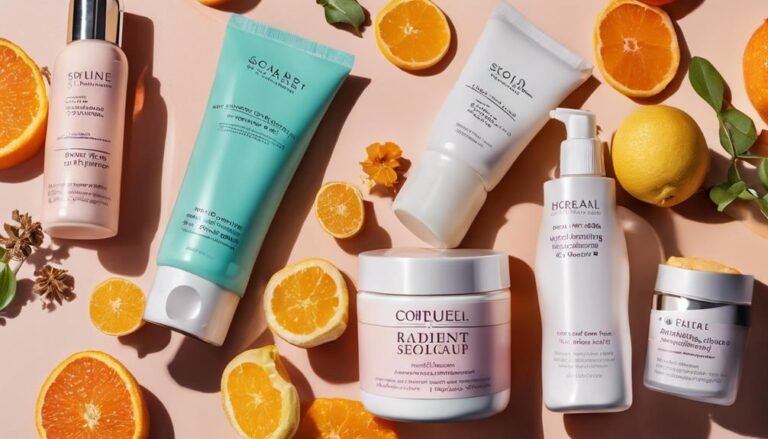How to Treat Adult Acne Effectively
You might not be aware that adult acne can differ in its causes and treatment approach compared to adolescent acne. Have you ever wondered why some common remedies don't seem to work for you? Understanding the nuances of adult acne, such as hormonal influences and lifestyle factors, is crucial to effectively managing breakouts. By addressing both internal and external factors, you can achieve clearer skin and regain your confidence. So, are you ready to uncover the holistic strategies that could finally help you conquer adult acne for good?
Understanding Adult Acne
Stress management plays a crucial role in adult acne as stress can worsen existing acne or even trigger new breakouts. When under stress, the body releases cortisol, a hormone that can increase inflammation and oil production in the skin, contributing to acne development. Incorporating stress-reducing practices such as mindfulness, exercise, adequate sleep, and relaxation techniques can help in improving acne symptoms.
Importance of Skincare Routine
Maintaining a consistent skincare routine is essential for managing adult acne effectively. Proper skincare not only helps in controlling breakouts but also promotes overall skin health.
One crucial aspect of a skincare routine for adult acne is ensuring adequate skin hydration. Hydrated skin is more resilient and less prone to inflammation, which can aggravate acne. Choose non-comedogenic moisturizers to prevent clogged pores while keeping your skin moisturized.
Additionally, the impact of diet on adult acne can't be overstated. Research suggests that certain foods, such as high-glycemic-index carbohydrates and dairy products, may exacerbate acne symptoms.
Consider incorporating more fruits, vegetables, whole grains, and lean proteins into your diet while reducing intake of sugary, processed foods. Keeping a food diary can help you identify potential triggers and make necessary adjustments.
Identifying Triggers and Causes
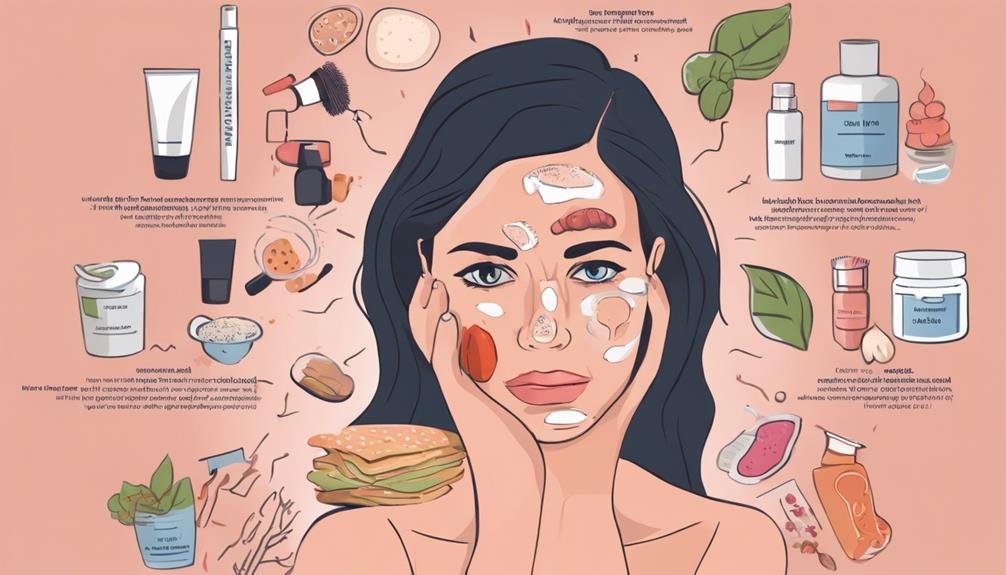
To effectively address adult acne, it is crucial to identify triggers and causes that may be contributing to your skin condition. Hormonal imbalances and stress management are key factors that can influence the development of adult acne. Hormonal fluctuations, commonly seen in women during menstruation, pregnancy, or menopause, can lead to increased oil production and breakouts. Stress can also play a significant role in exacerbating acne due to the release of stress hormones that can stimulate oil glands and trigger inflammation.
| Triggers | Causes |
|---|---|
| Hormonal imbalances | Excessive oil production |
| Stress | Clogged pores |
| Diet | Bacteria on the skin |
| Medications | Inflammation |
| Skincare products | Genetics |
Identifying these triggers and causes can help you tailor your treatment plan effectively. Consulting with a dermatologist can further pinpoint specific factors contributing to your adult acne and guide you towards a personalized skincare routine. Remember, addressing the root causes is essential for long-term management and clearer skin.
Using Non-Comedogenic Products
When dealing with adult acne, selecting the right skincare products is crucial to managing breakouts effectively. Opting for non-comedogenic products is key in preventing pore clogging, which can exacerbate acne. These products are specifically formulated to not block pores, reducing the likelihood of new breakouts.
When it comes to product selection, look for labels that explicitly mention "non-comedogenic" or "won't clog pores." Additionally, being ingredient-aware is essential. Ingredients like salicylic acid, benzoyl peroxide, hyaluronic acid, and niacinamide are often found in non-comedogenic products and can be beneficial for acne-prone skin.
Avoid products containing heavy oils, artificial fragrances, or pore-clogging ingredients like lanolin and mineral oil. By choosing non-comedogenic products and being mindful of the ingredients you use, you can help maintain clearer and healthier skin while effectively managing adult acne.
Incorporating Topical Treatments
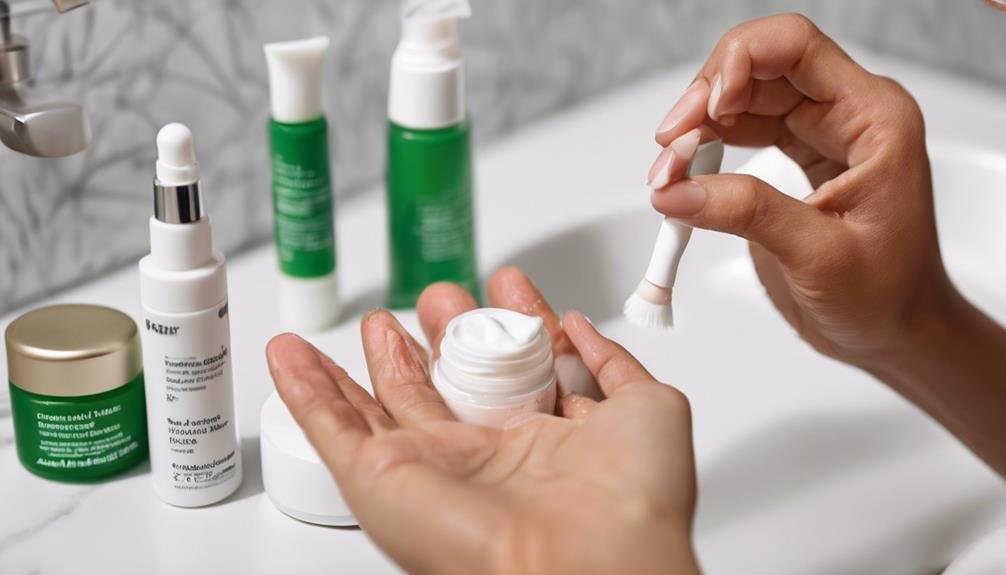
Incorporating topical treatments into your skincare routine is a crucial step in effectively managing adult acne. Topical solutions offer a targeted approach to treating acne directly on the skin's surface. When choosing treatment options, look for products containing ingredients like benzoyl peroxide, salicylic acid, or retinoids. Benzoyl peroxide works by reducing acne-causing bacteria and inflammation, while salicylic acid helps unclog pores and reduce excess oil. Retinoids, derived from vitamin A, promote skin cell turnover, preventing clogged pores and reducing acne lesions.
To incorporate these treatments effectively, start by cleansing your skin with a gentle, non-comedogenic cleanser. Apply a thin layer of the chosen topical solution to the affected areas once or twice daily, following the instructions provided. It's essential to be consistent with your routine and allow time for the products to work.
Remember to moisturize as some treatments may cause dryness or irritation. If you experience severe or persistent acne, consider consulting a dermatologist for personalized recommendations.
Seeking Professional Help
For those struggling with persistent or severe adult acne, seeking professional help from a dermatologist is crucial. A dermatologist consultation can provide a thorough examination of your skin to determine the underlying causes of your acne. These specialists can offer a range of treatment options tailored to your specific needs, from prescription-strength topical medications to in-office procedures.
In addition to dermatologists, skincare specialists can also assist in creating a personalized regimen to address your adult acne. These professionals are trained to analyze your skin type, concerns, and goals to recommend the most effective products and routines.
Exploring Oral Medications
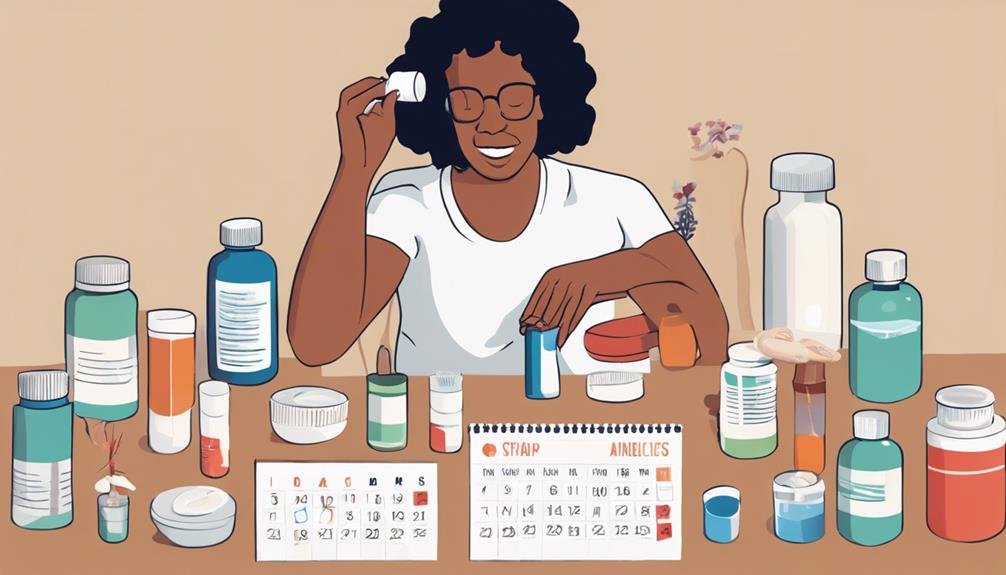
To effectively combat persistent adult acne, exploring oral medications may be a viable option for individuals seeking additional treatment beyond topical solutions. Oral antibiotics, such as doxycycline or minocycline, are commonly prescribed to target the bacteria that contribute to acne inflammation. These antibiotics work by reducing the number of acne-causing bacteria on the skin, ultimately decreasing breakouts. It's essential to follow your dermatologist's instructions carefully when taking oral antibiotics to ensure their effectiveness and minimize potential side effects like upset stomach or sun sensitivity.
In cases where hormonal imbalances are contributing to adult acne, hormonal therapy may be recommended. This type of treatment aims to regulate hormone levels, particularly androgens like testosterone, which can stimulate excess oil production and lead to acne flare-ups. Hormonal therapy options may include oral contraceptives or anti-androgen medications, which can help rebalance hormones and improve acne symptoms.
When considering oral medications for adult acne, it's crucial to consult with a healthcare professional to determine the most appropriate treatment plan based on your individual needs and medical history.
Trying Natural Remedies
Consider exploring natural remedies as a complementary approach to managing adult acne. Herbal supplements such as tea tree oil, green tea extract, and saw palmetto have shown promising results in reducing inflammation and fighting acne-causing bacteria. These supplements can be a gentle yet effective option for those looking to avoid harsh chemicals or medications.
DIY facials using ingredients like honey, turmeric, aloe vera, and apple cider vinegar can provide soothing and antibacterial benefits to the skin. Honey has natural antimicrobial properties, while turmeric can help reduce inflammation. Aloe vera is known for its calming effects, and apple cider vinegar can help balance the skin's pH levels.
It's important to remember that natural remedies may not work for everyone and could take time to show results. Consulting with a dermatologist before starting any herbal supplements or DIY treatments is recommended to ensure they're safe and suitable for your skin type.
Lifestyle Changes for Clearer Skin

Making lifestyle changes can significantly impact the clarity of your skin. When it comes to managing adult acne, two key areas to focus on are dietary adjustments and stress management.
Diet plays a crucial role in skin health. Consuming a balanced diet rich in fruits, vegetables, whole grains, and lean proteins can help reduce inflammation and support overall skin health. On the other hand, foods high in sugar, processed ingredients, and unhealthy fats may exacerbate acne. Keeping a food diary and noting any correlations between your diet and skin breakouts can help you identify trigger foods.
Stress is another significant factor that can contribute to acne flare-ups. High levels of stress trigger hormonal changes that can lead to increased oil production and inflammation in the skin. Incorporating stress-reducing activities such as yoga, meditation, exercise, or spending time in nature can help manage stress levels and improve skin clarity.
Maintaining Consistency and Patience
A key aspect of managing adult acne is maintaining consistency and practicing patience in your skincare routine. Consistency is crucial for allowing acne treatments to work effectively. Stick to your skincare regimen daily, even on days when your skin seems clear. Results may not be immediate, but with time, you'll notice improvements. Patience is key. Remember, acne is a complex skin condition that requires time to heal.
In addition to consistency and patience, incorporating self-care practices and stress management techniques can further support your skin health. Engage in activities that help you relax and unwind, such as yoga, meditation, or spending time in nature.
Stress can exacerbate acne, so managing it effectively can make a significant difference in your skin's appearance.
Frequently Asked Questions
Can Hormonal Changes in Menopause Trigger Adult Acne?
Yes, hormonal changes during menopause can trigger hormonal acne. Menopause skincare focuses on managing these shifts with gentle cleansers, non-comedogenic products, and possibly prescription treatments. Consult a dermatologist for personalized advice tailored to your skin's needs.
Does Stress Play a Significant Role in Adult Acne Flare-Ups?
When managing adult acne, remember that stress can trigger flare-ups. Skincare routines are crucial, but effective stress management is equally important. Prioritize self-care practices like meditation, exercise, and adequate sleep to help maintain clear skin.
Are There Specific Dietary Changes That Can Improve Adult Acne?
You've probably heard that dairy and sugar might impact your skin. Some individuals see improvements in adult acne by reducing dairy consumption and managing sugar intake. Consult with a healthcare provider to explore these dietary changes further.
Can Using Sunscreen Worsen Adult Acne Breakouts?
Using sunscreen with a high SPF can reduce the risk of sun damage but may worsen acne breakouts in some individuals due to sunscreen sensitivity. Check for non-comedogenic formulas to minimize acne triggers while protecting your skin.
How Long Should One Wait Before Switching Acne Treatments?
When considering switching acne treatments, it's essential to give each treatment enough time to gauge effectiveness. Typically, waiting 6-8 weeks before making a switch allows for proper assessment of how well a treatment is working for your skin.
Conclusion
In the symphony of skincare, your commitment to consistency and patience will be the key notes that harmonize your journey to clearer skin. By understanding the melody of adult acne and incorporating tailored treatments, you can orchestrate a beautiful composition of healing and self-care. Remember, like a delicate dance of skincare routines and lifestyle changes, your dedication will lead you to the radiant finale of healthier, happier skin.

